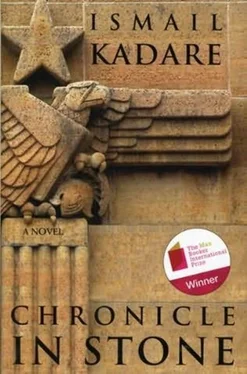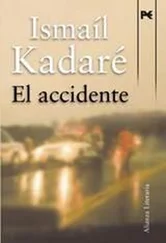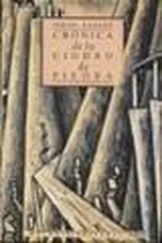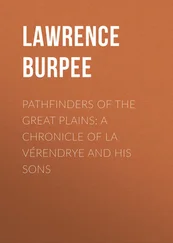Ismaíl Kadaré - Chronicle in Stone
Здесь есть возможность читать онлайн «Ismaíl Kadaré - Chronicle in Stone» весь текст электронной книги совершенно бесплатно (целиком полную версию без сокращений). В некоторых случаях можно слушать аудио, скачать через торрент в формате fb2 и присутствует краткое содержание. Жанр: Современная проза, на английском языке. Описание произведения, (предисловие) а так же отзывы посетителей доступны на портале библиотеки ЛибКат.
- Название:Chronicle in Stone
- Автор:
- Жанр:
- Год:неизвестен
- ISBN:нет данных
- Рейтинг книги:4 / 5. Голосов: 1
-
Избранное:Добавить в избранное
- Отзывы:
-
Ваша оценка:
- 80
- 1
- 2
- 3
- 4
- 5
Chronicle in Stone: краткое содержание, описание и аннотация
Предлагаем к чтению аннотацию, описание, краткое содержание или предисловие (зависит от того, что написал сам автор книги «Chronicle in Stone»). Если вы не нашли необходимую информацию о книге — напишите в комментариях, мы постараемся отыскать её.
Chronicle in Stone — читать онлайн бесплатно полную книгу (весь текст) целиком
Ниже представлен текст книги, разбитый по страницам. Система сохранения места последней прочитанной страницы, позволяет с удобством читать онлайн бесплатно книгу «Chronicle in Stone», без необходимости каждый раз заново искать на чём Вы остановились. Поставьте закладку, и сможете в любой момент перейти на страницу, на которой закончили чтение.
Интервал:
Закладка:
The old Hoxha family house was converted into a Hoxha Museum in the 1970s. It was blown up by protesters in 1997. The family home of Ismail Kadare described in this novel has also been destroyed, by an accidental fire that swept through the neighbourhood in 1999. Plans are in hand for a faithful reconstruction of it.
The great citadel remains unchanged and its eerie vaults now house a museum of military hardware. On the open-air esplanade of the fortress described in this book stands the decaying fuselage of a US spy plane that had the misfortune to wander into Albanian airspace more than thirty years ago.
David Bellos
Princeton, NJ
2 December 2006
A NOTE ON PRONUNCIATION
Most letters of the Albanian alphabet are pronounced roughly as in English. The main exceptions are as follows:
c ts as in curtsy
ç ch as in church
gj gy as in hogyard
j y as in year
q ky as in stockyard or the t in mature
x dz as in adze
xh j as in joke
zh s as in measure
CHRONICLE INSTONE
It was a strange city, and seemed to have been cast up in the valley one winter’s night like some prehistoric creature that was now clawing its way up the mountainside. Everything in the city was old and made of stone, from the streets and fountains to the roofs of the sprawling age-old houses covered with grey slates like gigantic scales. It was hard to believe that under this powerful carapace the tender flesh of life survived and reproduced.
The traveller seeing it for the first time was tempted to compare it to something, but soon found that impossible, for the city rejected all comparisons. In fact, it looked like nothing else. It could no more support comparison than it would allow rain, hail, rainbows, or multicoloured foreign flags to remain for long on its rooftops, for they were as fleeting and unreal as the city was lasting and anchored in solid matter.
It was a slanted city, set at a sharper angle than perhaps any other city on earth, and it defied the laws of architecture and city planning. The top of one house might graze the foundation of another, and it was surely the only place in the world where if you slipped and fell in the street, you might well land on the roof of a house – a peculiarity known most intimately to drunks.
Yes, a very strange city indeed. In some places you could walk down the street, stretch out your arm, and hang your hat on a minaret. Many things in it were simply bizarre, and others seemed to belong in a dream.
While preserving human life rather awkwardly by means of its tentacles and its stony shell, the city also gave its inhabitants a good deal of trouble, along with scrapes and bruises. That was only natural, for it was a stone city and its touch was rough and cold.
No, it was not easy to be a child in that city.
ONE
Outside the winter night had wrapped the city in water, fog and wind. Buried under my blankets, I listened to the muffled, monotonous sound of rain falling on the roof of our house.
I pictured the countless drops rolling down the sloping roof, hurtling to earth to turn to mist that would rise again in the high, white sky. Little did they know that a clever trap, a tin gutter, awaited them on the eaves. Just as they were about to make the leap from roof to ground, they suddenly found themselves caught in the narrow pipe with thousands of companions, asking “Where are we going, where are they taking us?” Then, before they could recover from that mad race, they plummeted into a deep prison, the great cistern of our house.
Here ended the raindrops’ life of joy and freedom. In the dark, soundless tank, they would recall with dreary sorrow the great spaces of sky they would never see again, the cities they’d seen from on high, and the lightning-ripped horizons. The only slice of the heavens they would see henceforth would be no bigger than the palm of my hand, on the occasions when I used a pocket mirror to send a fleeting memory of the endless sky to flicker on the surface of our reservoir.
The raindrops spent tedious days and months below, until my mother, bucket in hand, would draw them out, disoriented and dazed from the darkness, to wash our clothes, the stairs, the floor.
But for the moment they knew nothing of their fate. They ran happily and noisily across the slates, and I felt sorry for them as I listened to their wild chattering.
When it rained three or four days in a row, my father would push the gutter-pipe aside to keep the cistern from overflowing. It was a very large cistern, extending under most of our house, and if it ever overflowed, it could flood the cellar and wreck the foundation. As our city was all askew, anything could happen then.
As I lay wondering whether people or water suffered more in captivity, I heard footsteps and then the voice of my grandmother in the next room.
“Hurry, get up. You forgot to shift the down pipe.”
My father and mother leapt from their bed in alarm. Papa, in his long white drawers, ran down the dark hallway, opened the little window, and pushed the pipe aside with a long stick. Now we could hear the water splattering into the yard.
Mamma lit the kerosene lamp and led Papa and Grandmother downstairs. I went to the window and tried to see out. The wind was furious, dashing the rain against the windowpanes, making the eaves groan.
I was too curious to stay in bed and I ran downstairs to see what was happening. All three grown-ups looked worried. They did not even notice I was there. They had taken the cover off the cistern and were trying to see how high the water had risen. Mamma was holding the lamp while Papa leaned over the side and peered in.
I shivered all over and caught hold of Grandmother’s dress. She put her hand on my head affectionately. The wind shook the doors inside and out.
“What a downpour,” Grandmother said.
Papa, bent over, was still trying to see inside the cistern.
“Get a newspaper,” he told my mother.
She did. He crumpled it up, lit it, and dropped it into the cistern.
“The water’s almost up to the rim,” Papa said.
Grandmother started murmuring prayers.
“Quick,” my father cried, “the lantern.”
Mamma, pale as wax, her hands trembling, lit the lamp. Papa threw a black raincoat over his head, took the lamp, and headed for the door. Mamma tossed an old dress over her head and went after him.
“Where did they go, Grandmother?” I asked, frightened.
“Don’t be scared,” she replied. “Neighbours will come to help with bailing out, and then the cistern will calm down…” Her voice became rhythmical, as if she was whispering an old tale: “In this world, each ill has its cure. Only death, my dear boy, has no remedy.”
Muffled knocks at a door sounded through the rumbling of rain. Then again, and yet again.
“How can we lower the water, Grandmother?”
“With buckets, dear boy.”
I went to the opening and looked down. Darkness. Darkness and a feeling of terror.
“A-oo,” I said softly. But the cistern didn’t answer. It was the first time it had refused to answer me. I liked the cistern a lot and often leaned over its rim and had long talks with it. It had always been quick to answer me in its deep, cavernous voice.
“A-oo,” I said again, but still it was silent. I thought it must have been very angry.
I thought about how the countless raindrops were gathering their rage down below, the old ones that had been languishing there so long getting together with the newcomers, the drops unleashed by tonight’s storm, plotting something evil. Too bad Papa had forgotten to move the pipe. The waters of the storm never should have been let into our well-behaved cistern to stir up rebellion.
Читать дальшеИнтервал:
Закладка:
Похожие книги на «Chronicle in Stone»
Представляем Вашему вниманию похожие книги на «Chronicle in Stone» списком для выбора. Мы отобрали схожую по названию и смыслу литературу в надежде предоставить читателям больше вариантов отыскать новые, интересные, ещё непрочитанные произведения.
Обсуждение, отзывы о книге «Chronicle in Stone» и просто собственные мнения читателей. Оставьте ваши комментарии, напишите, что Вы думаете о произведении, его смысле или главных героях. Укажите что конкретно понравилось, а что нет, и почему Вы так считаете.












